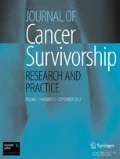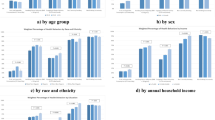Abstract
Purpose
Differences in health status and behavioral risk factors may explain racial/ethnic breast cancer disparities. We examined racial/ethnic differences in health status and behaviors among female breast cancer survivors compared to females without breast cancer.
Methods
Using cross-sectional data from the 2009 Behavioral Risk Factor Surveillance System, a national state-based, random sample telephone survey, we explored differences in self-rated health, obesity and selected behaviors (physical activity, smoking, alcohol use, fruit, and vegetable consumption) among females aged 18 years and older, who reported a previous breast cancer diagnosis (survivors, n = 10,035) and those who reported no breast cancer history (n = 234,375) by race/ethnicity. Adjusted prevalences of health status and behaviors, accounting for sociodemographics, comorbidities and health care access, were estimated by race/ethnicity.
Results
Compared to all other racial/ethnic groups, more white females reported heavy alcohol consumption and more black females reported obesity regardless of their breast cancer status. Among breast cancer survivors, more whites (33.7 %) were former smokers compared to blacks (24.5 %), “others” (20.5 %), and Hispanics (16.2 %) (p = 0.001). Racial/ethnic differences in obesity also varied by reported time since diagnosis (p value = 0.018). Among long-term survivors (diagnosed >5 years before interview), more black survivors (34.8 %) reported obesity compared to white survivors (23.0 %). Also, among “other” race survivors, long-term survivors (22.0 %) reported more obesity than survivors diagnosed less than 5 years before interview (7.8 %).
Conclusions
These findings suggest opportunities to increase health behaviors and reduce racial disparities among breast cancer survivors.
Implications for Cancer Survivors
Engaging in healthy behaviors can play a significant role in enhancing health outcomes and quality of life of breast cancer survivors. More research is needed to better understand racial differences in obesity, smoking and alcohol consumption in order to develop effective, culturally appropriate interventions to promote a healthy lifestyle after a breast cancer diagnosis.
Similar content being viewed by others
References
CDC. Cancer survivors in the United States, 2007. Morb Mortal Wkly Rep (MMWR). 2011;60(9):269–72.
Hewitt ME, Greenfield S, Stovall E, National Cancer Policy Board (U.S.). Committee on Cancer Survivorship: Improving Care and Quality of Life. (2006) From cancer patient to cancer survivor : lost in transition. National Academies Press, Washington, D.C.
Howlader N NA, Krapcho M, Neyman N, Aminou R, Waldron W, Altekruse SF, Kosary CL, Ruhl J, Tatalovich Z, Cho H, Mariotto A, Eisner MP, Lewis DR, Chen HS, Feuer EJ, Cronin KA, Edwards BK (eds) (2011) SEER Cancer Statistics Review, 1975–2008. National Cancer Institute. http://seer.cancer.gov/csr/1975_2008/, based on November 2010 SEER data submission, posted to the SEER web site, 2011. Accessed July 8 2011.
Norman SA, Potashnik SL, Galantino ML, De Michele AM, House L, Localio AR. Modifiable risk factors for breast cancer recurrence: what can we tell survivors? J Womens Health (Larchmt). 2007;16(2):177–90. doi:10.1089/jwh.2006.0047.
Demark-Wahnefried W, Pinto BM, Gritz ER. Promoting health and physical function among cancer survivors: potential for prevention and questions that remain. J Clin Oncol. 2006;24(32):5125–31.
Kwan ML, Kushi LH, Weltzien E, Tam EK, Castillo A, Sweeney C, Caan BJ. Alcohol consumption and breast cancer recurrence and survival among women with early-stage breast cancer: the life after cancer epidemiology study. J Clin Oncol. 2010;28(29):4410–6. doi:10.1200/JCO.2010.29.2730.
Kwan ML, Ambrosone CB, Lee MM, Barlow J, Krathwohl SE, Ergas IJ, Ashley CH, Bittner JR, Darbinian J, Stronach K, Caan BJ, Davis W, Kutner SE, Quesenberry CP, Somkin CP, Sternfeld B, Wiencke JK, Zheng S, Kushi LH. The Pathways Study: a prospective study of breast cancer survivorship within Kaiser Permanente Northern California. Cancer Causes Control. 2008;19(10):1065–76. doi:10.1007/s10552-008-9170-5.
Patterson RE, Cadmus LA, Emond JA, Pierce JP. Physical activity, diet, adiposity and female breast cancer prognosis: a review of the epidemiologic literature. Maturitas. 2010;66(1):5–15.
George SM, Irwin ML, Smith AW, Neuhouser ML, Reedy J, McTiernan A, Alfano CM, Bernstein L, Ulrich CM, Baumgartner KB, Moore SC, Albanes D, Mayne ST, Gail MH, Ballard-Barbash R. Postdiagnosis diet quality, the combination of diet quality and recreational physical activity, and prognosis after early-stage breast cancer. Cancer Causes Control. 2011;22(4):589–98. doi:10.1007/s10552-011-9732-9.
Thomson CA, Rock CL, Thompson PA, Caan BJ, Cussler E, Flatt SW, Pierce JP. Vegetable intake is associated with reduced breast cancer recurrence in tamoxifen users: a secondary analysis from the Women’s Healthy Eating and Living Study. Breast Cancer Res Treat. 2011;125(2):519–27. doi:10.1007/s10549-010-1014-9.
Pierce JP, Stefanick ML, Flatt SW, Natarajan L, Sternfeld B, Madlensky L, Al-Delaimy WK, Thomson CA, Kealey S, Hajek R, Parker BA, Newman VA, Caan B, Rock CL. Greater survival after breast cancer in physically active women with high vegetable–fruit intake regardless of obesity. J Clin Oncol. 2007;25(17):2345–51. doi:10.1200/JCO.2006.08.6819.
Kellen E, Vansant G, Christiaens MR, Neven P, Van Limbergen E. Lifestyle changes and breast cancer prognosis: a review. Breast Cancer Res Treat. 2009;114(1):13–22. doi:10.1007/s10549-008-9990-8.
Sheppard AJ, Chiarelli AM, Marrett LD, Nishri ED, Trudeau ME. Stage at diagnosis and comorbidity influence breast cancer survival in first nations women in Ontario, Canada. Cancer Epidemiol Biomarkers Prev. 2011;20(10):2160–7.
Patnaik JL, Byers T, Diguiseppi C, Denberg TD, Dabelea D. The influence of comorbidities on overall survival among older women diagnosed with breast cancer. J Natl Cancer Inst. 2011;103(14):1101–11.
Coups EJ, Ostroff JS. A population-based estimate of the prevalence of behavioral risk factors among adult cancer survivors and noncancer controls. Prev Med. 2005;40(6):702–11.
Bellizzi KM, Rowland JH, Jeffery DD, McNeel T. Health behaviors of cancer survivors: examining opportunities for cancer control intervention. J Clin Oncol. 2005;23(34):8884–93.
Irwin ML, McTiernan A, Bernstein L, Gilliland FD, Baumgartner R, Baumgartner K, Ballard-Barbash R. Physical activity levels among breast cancer survivors. Med Sci Sports Exerc. 2004;36(9):1484–91.
Irwin ML, Crumley D, McTiernan A, Bernstein L, Baumgartner R, Gilliland FD, Kriska A, Ballard-Barbash R. Physical activity levels before and after a diagnosis of breast carcinoma: the Health, Eating, Activity, and Lifestyle (HEAL) study. Cancer. 2003;97(7):1746–57. doi:10.1002/cncr.11227.
Wayne SJ, Lopez ST, Butler LM, Baumgartner KB, Baumgartner RN, Ballard-Barbash R. Changes in dietary intake after diagnosis of breast cancer. J Am Diet Assoc. 2004;104(10):1561–8. doi:10.1016/j.jada.2004.07.028.
Irwin ML, McTiernan A, Baumgartner RN, Baumgartner KB, Bernstein L, Gilliland FD, Ballard-Barbash R. Changes in body fat and weight after a breast cancer diagnosis: influence of demographic, prognostic, and lifestyle factors. J Clin Oncol. 2005;23(4):774–82. doi:10.1200/JCO.2005.04.036.
Paxton RJ, Jones LA, Chang S, Hernandez M, Hajek RA, Flatt SW, Natarajan L, Pierce JP. Was race a factor in the outcomes of the Women’s Health Eating and Living Study? Cancer. 2011;117(16):3805–13. doi:10.1002/cncr.25957.
Paxton RJ, Phillips KL, Jones LA, Chang S, Taylor WC, Courneya KS, Pierce JP. Associations among physical activity, body mass index, and health-related quality of life by race/ethnicity in a diverse sample of breast cancer survivors. Cancer. 2012;118(16):4024–31. doi:10.1002/cncr.27389.
Paskett ED, Alfano CM, Davidson MA, Andersen BL, Naughton MJ, Sherman A, McDonald PG, Hays J. Breast cancer survivors’ health-related quality of life: racial differences and comparisons with noncancer controls. Cancer. 2008;113(11):3222–30. doi:10.1002/cncr.23891.
Bigby J, Holmes MD. Disparities across the breast cancer continuum. Cancer Causes Control. 2005;16(1):35–44. doi:10.1007/s10552-004-1263-1.
Centers for Disease Control and Prevention Behavioral Risk Factor Surveillance System. http://www.cdc.gov/BRFSS/. Accessed June 10 2011
Fairley TL, Pollack LA, Moore AR, Smith JL. Addressing cancer survivorship through public health: an update from the Centers for Disease Control and Prevention. J Womens Health (Larchmt). 2009;18(10):1525–31. doi:10.1089/jwh.2009.1666.
Rabin C. Review of health behaviors and their correlates among young adult cancer survivors. J Behav Med. 2011;34(1):41–52. doi:10.1007/s10865-010-9285-5.
Findley PA, Sambamoorthi U. Preventive health services and lifestyle practices in cancer survivors: a population health investigation. J Cancer Surviv. 2009;3(1):43–58. doi:10.1007/s11764-008-0074-x.
Haskell WL, Lee IM, Pate RR, Powell KE, Blair SN, Franklin BA, Macera CA, Heath GW, Thompson PD, Bauman A. Physical activity and public health: updated recommendation for adults from the American College of Sports Medicine and the American Heart Association. Med Sci Sports Exerc. 2007;39(8):1423–34. doi:10.1249/mss.0b013e3180616b27.
United States Department of Health and Human Services (2008) 2008 Physical activity guidelines for Americans. www.health.gov/paguidelines. Accessed July 2011
Skeie G, Hjartaker A, Lund E. Diet among breast cancer survivors and healthy women. The Norwegian Women and Cancer Study. Eur J Clin Nutr. 2006;60(9):1046–54. doi:10.1038/sj.ejcn.1602416.
Bennett JA, Cameron LD, Brown PM, Whitehead LC, Porter D, Ottaway-Parkes T, Robinson E. Time since diagnosis as a predictor of symptoms, depression, cognition, social concerns, perceived benefits, and overall health in cancer survivors. Oncol Nurs Forum. 2010;37(3):331–8. doi:10.1188/10.ONF.331-338.
Smith AW, Alfano CM, Reeve BB, Irwin ML, Bernstein L, Baumgartner K, Bowen D, McTiernan A, Ballard-Barbash R. Race/ethnicity, physical activity, and quality of life in breast cancer survivors. Cancer Epidemiol Biomarkers Prev. 2009;18(2):656–63. doi:1055-9965.EPI-08-0352.
Schootman M, Deshpande AD, Pruitt SL, Aft R, Jeffe DB. National estimates of racial disparities in health status and behavioral risk factors among long-term cancer survivors and non-cancer controls. Cancer Causes Control. 2010;21(9):1387–95. doi:10.1007/s10552-010-9566-x.
CDC (2011) Surveillance of certain health behaviors and conditions among states and selected local areas—behavioral risk factor surveillance system, United States, 2009. Morbidity and Mortality Weekly Report (MMWR) Surveillance Summary 60 (9):1-250.
Pollack LA, Adamache W, Ryerson AB, Eheman CR, Richardson LC. Care of long-term cancer survivors: physicians seen by Medicare enrollees surviving longer than 5 years. Cancer. 2009;115(22):5284–95. doi:10.1002/cncr.24624.
Demark-Wahnefried W, Aziz NM, Rowland JH, Pinto BM. Riding the crest of the teachable moment: promoting long-term health after the diagnosis of cancer. J Clin Oncol. 2005;23(24):5814–30.
Desai MM, Bruce ML, Desai RA, Druss BG. Validity of self-reported cancer history: a comparison of health interview data and cancer registry records. Am J Epidemiol. 2001;153(3):299–306.
Bradbury BD, Brooks DR, Brawarsky P, Mucci LA. Test–retest reliability of colorectal testing questions on the Massachusetts Behavioral Risk Factor Surveillance System (BRFSS). Prev Med. 2005;41(1):303–11.
Andresen EM, Catlin TK, Wyrwich KW, Jackson-Thompson J. Retest reliability of surveillance questions on health related quality of life. J Epidemiol Community Health. 2003;57(5):339–43.
Yore MM, Ham SA, Ainsworth BE, Kruger J, Reis JP, Kohl 3rd HW, Macera CA. Reliability and validity of the instrument used in BRFSS to assess physical activity. Med Sci Sports Exerc. 2007;39(8):1267–74. doi:10.1249/mss.0b013e3180618bbe.
Nelson DE, Holtzman D, Bolen J, Stanwyck CA, Mack KA. Reliability and validity of measures from the Behavioral Risk Factor Surveillance System (BRFSS). Soz Praventivmed. 2001;46 Suppl 1:S3–S42.
Author information
Authors and Affiliations
Corresponding author
Additional information
The findings and conclusions in this report are those of the authors and do not necessarily represent the official position of the Centers for Disease Control and Prevention.
Rights and permissions
About this article
Cite this article
White, A., Pollack, L.A., Smith, J.L. et al. Racial and ethnic differences in health status and health behavior among breast cancer survivors—Behavioral Risk Factor Surveillance System, 2009. J Cancer Surviv 7, 93–103 (2013). https://doi.org/10.1007/s11764-012-0248-4
Received:
Accepted:
Published:
Issue Date:
DOI: https://doi.org/10.1007/s11764-012-0248-4




